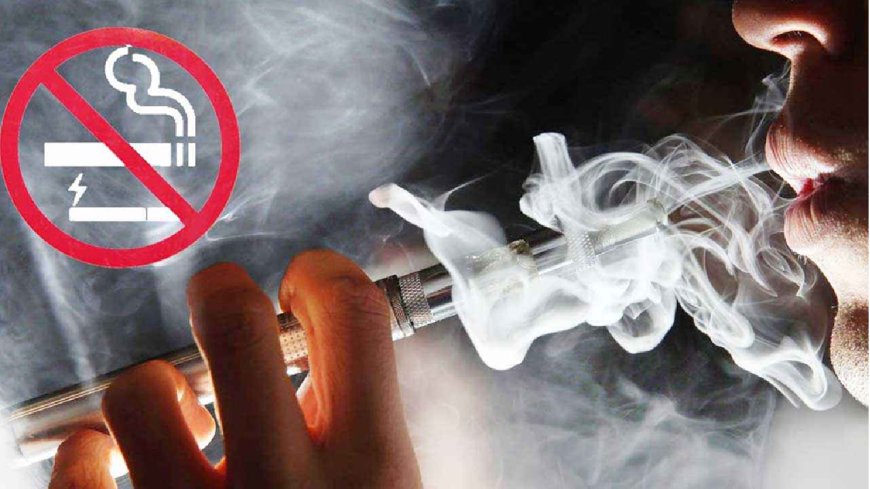Vape vs Vow: Bangladesh Marks World No Tobacco Day Amid E-Cigarette Surge

On Saturday, May 31, Bangladesh observed World No Tobacco Day 2025 under the theme “Unmask Tobacco Industry Tactics, Build a Tobacco- and Nicotine-Free Bangladesh.” To mark the day, the National Tobacco Control Cell (NTCC) under the Health Services Division of the Ministry of Health and Family Welfare undertook a series of initiatives, accompanied by day-long programs organized by various anti-tobacco organizations. Globally, the day promotes a 24-hour abstinence from all forms of tobacco consumption.
Despite such initiatives, the market for nicotine products remains active, with the rising use of Electronic Nicotine Delivery Systems (ENDS) or e-cigarettes as alternatives to conventional cigarettes. These battery-operated devices, often made of fiber or plastic and available in flashy designs and enticing flavors, have become popular despite being officially banned for import. Nevertheless, their sale and use continue openly across the country.
In a media message marking World No Tobacco Day, Chief Adviser Professor Dr. Muhammad Yunus said, “The interim government has already completely banned the import of e-cigarettes and related products and has increased taxes on traditional tobacco products. At the same time, steps have been taken to strengthen the tobacco control law in line with the WHO Framework Convention on Tobacco Control (FCTC).”
However, e-cigarettes continue to be sold on various e-commerce platforms and social media pages through attractive advertisements and offers, bypassing legal restrictions. In many cases, these lower-quality devices are even cheaper than premium cigarettes, making them more accessible to underage users. As a result, vaping has become rampant in public spaces such as hospitals, parks, restaurants, and educational institutions, putting both smokers and non-smokers—including women and children—at risk of illnesses like cancer, heart disease, and kidney disorders. The number of female smokers is also reportedly increasing.
According to surveys, approximately 35% of Bangladesh’s adult population—roughly 37.8 million people—use tobacco. This includes 22 million smokeless tobacco users (20.6%) and 19.2 million smokers (18%). In addition, around 38.4 million people are exposed to secondhand smoke. Tobacco use has led to permanent disabilities in nearly 382,000 individuals. Alarmingly, 9.2% of students aged 13 to 15 are also tobacco users.
Data from the Ministry of Health and the Bangladesh Bureau of Statistics (2017) confirms that 35.3% of adults use tobacco. However, the actual figure is likely higher when factoring in children and adolescents, signaling a dangerous trend.
A separate study by the non-profit Dhaka Ahsania Mission revealed a 100% violation rate of tobacco control laws in public buses. Of the 417 buses surveyed, 91% permitted smoking, while only 9% appeared smoke-free. Cigarette butts were found in 79% of buses, and none displayed legally required warning signs. Alarmingly, 89% of public transport users were found to smoke, including 62% who did so while on duty.
Researchers at Manchester Metropolitan University warned that vaping could pose greater health risks than traditional smoking. They stated that users inhale nicotine through vapor created by heating liquids containing propylene glycol, glycerin, flavorings, and other chemicals. “Those who vape are no safer than smokers,” scientists cautioned.
Dr. Maxime Bouidin, lead researcher and cardiac rehabilitation specialist, added: “Smokers typically finish a cigarette and pause before lighting another. In contrast, vaping allows for continuous consumption, making it hard to track the number of puffs taken.” He noted that vaping could increase heart rate and blood pressure, constrict blood vessels, and damage artery walls.
While the UK's National Health Service (NHS) promotes vaping as a safer alternative to smoking, many health experts continue to highlight its risks. Long-term impacts of the toxic substances in e-cigarettes remain largely unknown.
Doctors warned that young users could face an increase in lung diseases, dental issues, and cancer within the next decade. Researchers monitored 27-year-old participants with similar physical fitness levels, tracking vascular elasticity and cerebral blood flow through regular stress tests after a 12-hour abstinence from vaping, smoking, and exercise.
Despite the documented dangers, e-cigarette distribution continues. Dhaka Customs House recently seized three consignments at Shahjalal International Airport containing foreign cigarettes and banned flavored e-cigarettes worth Tk 80 million. The importer, IGM, had falsely declared the items as “consumables” and “lithium batteries” to bypass the ban. Authorities discovered 12,980 e-cigarettes infused with approximately 300 liters of vape flavor.
Experts point to weaknesses in current tobacco control laws, stating that they fail to protect the public from tobacco’s deadly grip. They stress the urgent need to update and reinforce legislation. “To build a tobacco- and nicotine-free Bangladesh, we must adopt stricter policies and expand public awareness,” experts urged. “Protecting the youth should not hinge on a single observance day, but must become a daily commitment.”









































































































































































































